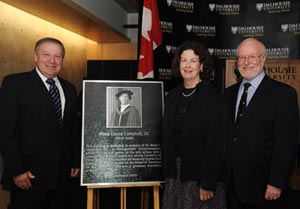 |
| Premier Darrell Dexter and Dal student Camila Das Gupta share a laugh. (Danny Abriel Photo) |
Inside her classroom, student Camila Das Gupta learns about sustainability. From now on, that classroom will be situated in a building described as âthe greenest on campus, the greenest in the city, perhaps the greenest in the Maritimesâ" by the provinceâs premier Darrell Dexter.
Ms. Das Gupta was on hand during the official naming ceremony for the Mona Campbell Building, located on the corner of LeMarchant Street and Coburg Road.
âItâs really thrilling to have the home of my program in a building that reflects what Iâm studying and what I believe in,â says Ms. Das Gupta, a second-year student who is combining programs in international development studies and environment, sustainability and society.
|
The Province of Nova Scotia provided significant support for this particular campus renewal project. Through the Nova Scotia Infrastructure Trust, $11.3 million was provided.
The building provides a new home for the College of Sustainability, the College of Continuing Education, the School of Social Work, and others.
âThe fact that the new building co-hosts a number of units from different areas has already provided opportunities for cross-fertilization,â says Andy Cochrane, dean of the College of Continuing Education. âThe mixture of staff and students has created a uniquely diverse population in the building.â
The building is a candidate to achieve a Leadership in Energy and Environmental Design (LEED) gold rating.
âI find it quite appropriate that this building will also be home to the College of Sustainability, whose international leadership contributes to Nova Scotiaâs progress on climate change,â says Premier Dexter. âThe building you see before you is an important step toward Nova Scotiaâs goal to be more energy efficient and environmentally sustainable.â
Making a mark on Halifax
The silhouette of grain elevators used to load flour into waiting ships has long made the skyline of Halifax unique. This landmark of Dover Industries is now joined by another monument to the familyâs community legacy, the Mona Campbell Building. The namesake of the latest campus addition had a long association with the university and many community affiliations. ±«Óătv awarded the late Mona Campbell an honorary degree in 1982. When Dr. Campbell was only 33, she inherited major shares in several companies. Just two years later she assumed the top executive position of Dover Industries, a position her late father would not have imagined a woman holding. The year was 1954 and female executives were few and far between. When she first took over Dover Industries, it was a modest company that milled flour and produced ice-cream cones. Under her leadership, the company grew into Canadaâs first conglomerate, with interests in paper products, flour milling, straw manufacturing ... and still, the ice-cream cones. Last year, Dover Industries earned $200 million and employed 500 people, notes ±«Óătvâs President Tom Traves. In addition to sitting on the board of Dover Industries, Dr. Campbell was the first woman elected to the board of Toronto-Dominion Bank. She maintained her interest in ±«Óătv, serving on the Board of Governors and the Advisory Board for the School of Business Administration. She also sat on the board for the Canadian Club of Toronto and the Metropolitan Toronto Zoo. The arts owe a great deal to her patronage. She was a founding member of the Royal Ontario Museum and the Toronto branch of the National Ballet and National Youth Orchestra. She bequeathed her collection of Lorenzen ceramic mushrooms to the Art Gallery of Nova Scotia because she wanted the art to be appreciated in the province where it was produced. Close to her heart was her farm near Guelph where she was surrounded by dogs, cattle and thoroughbred horses. Dr. Campbell was a prominent supporter of the Ontario Humane Society and the veterinary program at Guelph University. - Mel Hennigar and Amanda Pelham |
Ìę

